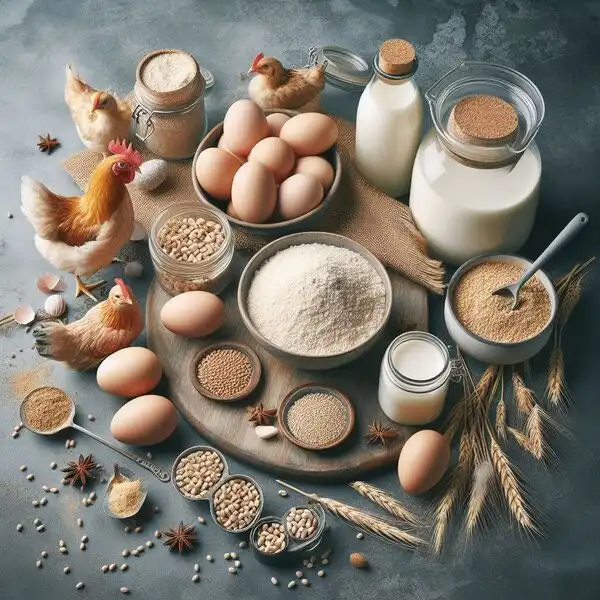Introduction to Fermented Chicken Feed
Feeding chickens a healthy diet is paramount for their well-being and the quality of products they provide, such as eggs and meat. In this section, we'll delve into the benefits of incorporating fermented chicken feed into your poultry management practices, along with an overview of the fermentation process.
Benefits of Fermented Chicken Feed
- Improved Nutrient Absorption: Fermentation breaks down the protective coating of grains, making nutrients more readily available for absorption by chickens. This enhances their overall health and productivity.
- Enhanced Digestibility: The fermentation process softens grains and reduces the presence of phytic acid and enzyme inhibitors, facilitating easier digestion for chickens. This leads to improved nutrient utilization and less strain on their digestive systems.
- Boosted Immunity: Fermented feed introduces probiotics into chickens' diets, promoting a healthy gut microbiome. A robust gut flora strengthens chickens' immune systems, helping them resist diseases and infections more effectively.
Importance of Providing Healthy Feed for Chickens
Just like humans, chickens benefit from a balanced and nutritious diet. By feeding them fermented feed, we ensure that they receive essential nutrients in a form that is easily digestible and bioavailable. This contributes to their overall health, vitality, and longevity.
Overview of the Fermentation Process
The fermentation process involves soaking grains in water for a specific period, allowing beneficial bacteria to proliferate and initiate the breakdown of complex carbohydrates. Over time, this results in a tangy, probiotic-rich feed that offers numerous health benefits to chickens.

Next, we'll explore the health advantages of fermented chicken feed in greater detail.
TIP: Provide your animals with a clean and spacious living environment to promote their health and well-being.
Health Benefits of Fermented Chicken Feed
Fermented chicken feed offers a multitude of health benefits for poultry, ranging from improved egg quality to enhanced digestive health. Let's explore these advantages in detail:
Enhanced Egg Quality
- Impact of Diet on Egg Nutrition: The nutritional composition of eggs is directly influenced by the diet of the laying hens. Chickens fed a diet rich in fermented feed produce eggs that are notably superior in quality and nutrition.
- Role of Fermented Feed in Producing High-Quality Eggs: Fermented feed provides chickens with a balanced array of nutrients, including essential vitamins, minerals, and amino acids, which are essential for optimal egg production and quality.
Reduction of Phytic Acid & Enzyme Inhibitors
- Effect on Digestive Health: Phytic acid and enzyme inhibitors present in raw grains can hinder nutrient absorption and cause digestive discomfort in chickens. Fermentation breaks down these anti-nutrients, promoting better digestion and nutrient utilization.
- Improved Nutrient Absorption: By reducing phytic acid and enzyme inhibitors, fermented feed allows chickens to absorb a higher percentage of available nutrients from their diet, leading to improved overall health and vitality.
Probiotics & Immune System Support
- Comparison with Human Probiotic Consumption: Just as humans benefit from consuming probiotic-rich foods for gut health, chickens experience similar advantages from fermented feed. Probiotics support a healthy gut microbiome, enhancing immune function and disease resistance.
- Impact on Poultry Health and Disease Prevention: A robust immune system is crucial for protecting chickens from common poultry diseases. The probiotics present in fermented feed help bolster chickens' natural defenses, reducing the risk of infections and illnesses.
Reduction in Feed Cost
- Volume Increase and Cost Savings: Fermenting chicken feed increases its volume, allowing homesteaders to stretch their feed budget further. Additionally, because chickens absorb more nutrients from fermented feed, they require less overall food, resulting in additional cost savings.
- Nutritional Efficiency of Fermented Feed: The nutrient density of fermented feed means that chickens receive greater nutritional benefits from smaller quantities of food. This not only reduces feed costs but also ensures that chickens receive optimal nutrition for growth, egg production, and overall health.
These health benefits underscore the importance of incorporating fermented chicken feed into poultry management practices. By optimizing nutrition and supporting immune function, fermented feed contributes to healthier, happier chickens and higher-quality poultry products.
Explore our extensive write-up on Understand medicinal uses roses guide and discover all the nuances and important details. It's an engaging read filled with useful knowledge.
Our latest post on A closer look at raising backyard egg chickens covers everything you need to know. From interesting facts to in-depth analysis, it’s the ultimate resource for anyone interested in this topic.
Our blog post on Discover the details of guide plum jelly tips is a must-read for anyone interested in the subject. It’s filled with comprehensive details and thoughtful perspectives.
How to Ferment Chicken Feed: Step-by-Step Guide
Fermenting chicken feed is a straightforward process that requires minimal equipment and effort. Follow these detailed steps to ferment your chicken feed effectively:
Our in-depth coverage on Explore fudgy sourdough brownies recipes storage tips provides a wealth of information and insights. Be sure to check it out for a comprehensive understanding of the topic.
Setup and Equipment Needed
- Bucket System Overview: Set up a fermentation station using food-grade plastic buckets or glass containers with lids. Each bucket will represent a different stage of the fermentation process, allowing for easy rotation and management.
- Adjustments for Climate Variations: Depending on your climate, fermentation times may vary. In warmer temperatures, the fermentation process accelerates, while colder climates may require more time. Experiment with different fermentation durations to find the optimal timing for your environment.
Day-By-Day Fermentation Process
- Detailed Instructions for Each Day: Begin by adding a measured quantity of chicken feed to the first bucket, covering it with water to create a slurry-like consistency. Stir the mixture thoroughly to ensure even hydration. Cover the bucket with a lid, allowing for airflow while preventing contamination.
- Importance of Observing Fermentation Progress: Monitor the fermentation process daily, noting any changes in odor, appearance, or texture. As fermentation progresses, you may observe bubbles forming on the surface of the feed, indicating the activity of beneficial bacteria.
Starter Culture Considerations
- Benefits of Adding Starter Culture: While not necessary, adding a starter culture can jump-start the fermentation process, ensuring a more consistent and rapid transformation of the feed. Starter cultures introduce beneficial bacteria that aid in fermentation and enhance nutrient bioavailability.
- Alternative Inoculation Methods: If you prefer not to use a commercial starter culture, you can inoculate your feed with a small quantity of fermented liquid from a previous batch. This introduces a diverse range of beneficial microorganisms that promote healthy fermentation.
Choosing the Right Chicken Feed
- Organic vs. Non-GMO Options: Selecting high-quality chicken feed is essential for successful fermentation. Opt for organic or non-GMO feed whenever possible, as these options are free from pesticides, herbicides, and genetically modified ingredients.
- Feasibility of Fermenting Mash or Pellets: While fermenting scratch feed is common and straightforward, you may also ferment other types of chicken feed, such as mash or pellets. However, these may require additional considerations due to their different textures and compositions.
By following these step-by-step instructions and considering the equipment and feed options available, you can successfully ferment chicken feed at home, providing your poultry with a nutritious and cost-effective dietary supplement.
\nFeeding Practices and Tips
Feeding fermented chicken feed requires careful attention to ensure optimal nutrition and health for your poultry. Here are some essential practices and tips to consider:
Determining Feeding Quantity
- Factors Affecting Feed Consumption: Various factors influence how much feed your chickens consume, including age, breed, activity level, and environmental conditions. Younger chickens typically eat more than mature birds, while laying hens may require additional nutrients to support egg production.
- Monitoring Chicken Behavior and Egg Production: Observe your chickens' behavior and egg-laying patterns to gauge their nutritional needs. A sudden decrease in egg production or changes in appetite may indicate deficiencies in their diet. Adjust feed quantities accordingly to meet their requirements.
Adjusting Feed Based on Chickens' Needs
- Response to Free-Ranging and Dietary Changes: Chickens that have access to pasture or free-range environments may consume additional nutrients from foraging. Consider supplementing their diet with fermented feed to ensure they receive essential vitamins and minerals, especially during periods of limited forage availability.
- Strategies for Ensuring Optimal Nutrition: To maintain balanced nutrition, provide a diverse diet that includes a mix of fermented feed, fresh greens, grains, and protein sources. Rotate feeding areas regularly to prevent overgrazing and ensure access to a variety of nutrients.
Addressing Common Concerns and FAQs
- Feeding Fermented Grains to Different Animals: While chickens readily consume fermented feed, other livestock species may also benefit from this nutritious supplement. However, it's essential to introduce fermented grains gradually to avoid digestive upset and monitor the animals' response.
- Suitability of Fermented Scratch as Sole Feed: Fermented scratch feed can serve as a primary source of nutrition for chickens, particularly when supplemented with other foods. However, it's essential to ensure that the fermented feed meets their dietary requirements for protein, vitamins, and minerals.
- Assessing Fermented Feed Quality: Regularly evaluate the quality of your fermented feed to ensure its safety and effectiveness. Look for signs of spoilage, such as foul odors, mold growth, or abnormal textures, and discard any feed that appears contaminated.
By implementing these feeding practices and tips, you can optimize the health and productivity of your poultry flock while maximizing the benefits of fermented chicken feed.

 Emma
Emma

